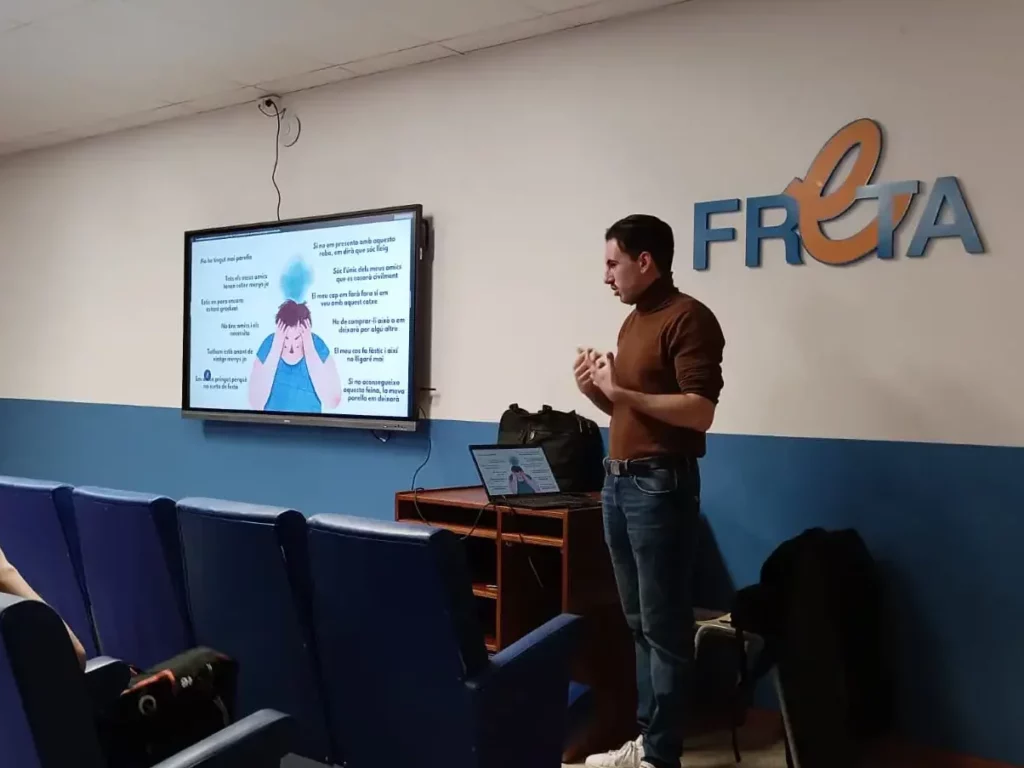Cada any, les Escoles Freta Calella em truca per fer un petit Workshop sobre Publicitat, RRPP, Xarxes Socials o Audiovisuals. M’agrada canviar de tema cada any i poder donar un enfocament juvenil i dinàmic als temes que tracto. Aquest any, essent el 5è que faig, he decidit proposar un tema una mica controvertit: Autoestima Digital. Aquest concepte ha anat agafant un auge que a poc a poc s’ha anat fent camí dins la consciència popular, cosa que considero totalment necessària.
En aquesta xerrada, vaig decidir exposar la visió d’un autor que em va apassionar quan estava a la carrera i que, essent considerant un boig a la seva època, més d’un el considera un visionari de l’actualitat: el sociòleg de masses Thorstein Veblen. Dita figura escrigué un llibre l’any 1899 anomenat “Teoria de la Classe Ociosa” i, de manera molt resumida, m’agradaria exposar alguns dels preceptes que Veblen demostra en aquesta obra així com ho vaig fer a la meva xerrada:
- L’ésser humà enveja i busca ser envejat per aquells que l’envolten.
- La propietat esdevé una mostra de poder entre els nostres iguals.
- Els sentiments són propietats a comprar i a presumir
- No posseir igual o més que els nostres iguals implica el fracàs i el rebuig.
- La forma més antiga de propietat va ser la dona i, posteriorment, els esclaus.
- Hi ha una classe ociosa i una que no ho és.
- Es busca millorar i créixer sota qualsevol circumstància.
- Consumir més del que es necessita significa poder.
- El consum es dona per satisfer els usuaris, no sols per cobrir una necessitat.
Quan vaig exposar aquests conceptes, més d’un alumne es va quedar perplex de saber que això es parlava l’any 1899 de la mà d’una persona que ni tant sols tenia telèfon, mirava poc la premsa i ni molt menys penjava Stories. És aquí on el vertader debat i conflicte comença: per què som capaços de pensar d’aquesta manera tan ambiciosa i monstruosa?

Llavors van sortir les primeres respostes “El Màrqueting ens ha posat al cap idees de compra que nosaltres no teníem.” “Els polítics ens inciten a polaritzar-nos cap a una banda i després el Màrqueting agafa aquesta informació per vendre’ns coses” “La Publicitat ens posa idees subliminars mitjançant les produccions audiovisuals i els influenciadors”…
Cap d’aquestes respostes és incorrecta, no podem dir que no a una cosa tan òbvia i tan persistent a la nostra societat. Aquests agents oligàrquics i “d’estatus superior” que els miren de convèncer per tal que realitzem una acció beneficiosa per la seva causa.
Però són ells els que realitzen l’acció de compra innecessària? Són ells els que senten un cert odi o enveja que alimenta una acció en particular? Són ells els que tenen una certa necessitat a satisfer per tal d’obtenir felicitat o tranquil·litat? Són ells els que vertaderament prenen les decisions que ens fan més mal que bé?
Llavors vaig deixar anar una pregunta que en un principi semblava retòrica, però que va ser prou contundent per a fer passar un àngel entre els joves: Vosaltres creieu que, per exemple, Lamborghini trauria uns models cada cop més cars i ràpids si no sabés que hi ha persones disposades a pagar-los? La resposta és que no, cap marca “dinàstica” de l’actualitat fa cap acció perquè sí.
Les marques, els influenciadors i, més antigament, les agrupacions polítiques i fins i tot les religions han escoltat atentament el que els seus públics opinen, estimen, odien, desitgen i envegen: i aquesta informació és extremadament poderosa. I encara que ens faci molt mal admetre-ho, escoltar i proposar no té res de dolent.
El que és vertaderament dolent en aquesta situació és la nostra capacitat de ser convençuts a partir de les nostres pròpies conviccions. Busquem la satisfacció d’una enveja, estima, desig o enuig que no necessitem, sinó que simplement volem que se satisfaci per dir que s’ha satisfet. Us imagineu que senzill que seria comprar-se una peça de roba si no haguéssim de pensar qui ens veurà bé, qui no, qui ens admirarà, qui es riurà de nosaltres… Pensem això pel simple fet que tothom té la capacitat d’imposar una satisfacció per sobre de la nostra necessitat real: això no ho fa una marca, ho fa la persona que la compra.
La solució no és acabar amb les marques, sinó acabar amb la nostra pròpia ambició com a raça animal que ens obliga a superar als nostres iguals costi el que costi, fins i tot si això implica una imposició d’ideals. Les guerres, les baralles, els safareigs, els insults i els actes d’enveja o d’odi són gasolina i informació d’organitzacions i marques que se’n beneficien. Però l’origen d’això no està en ningú més que en nosaltres mateixos.
Podríem viure i deixar viure sols amb el que vertaderament necessitem? Des de l’acte humà de compartir i de reduir les necessitats als conceptes més simples? Espero les vostres respostes a la capsa de comentaris!
Leave a Reply